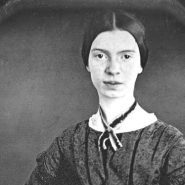By Robert Frost (1923)
Whose woods these are I think I know.
His house is in the village though;
He will not see me stopping here
To watch his woods fill up with snow.
My little horse must think it queer
To stop without a farmhouse near
Between the woods and frozen lake
The darkest evening of the year.
He gives his harness bells a shake
To ask if there is some mistake.
The only other sound’s the sweep
Of easy wind and downy flake.
The woods are lovely, dark and deep,
But I have promises to keep,
And miles to go before I sleep,
And miles to go before I sleep.
Analysis
Frost casts a brief winter halt as a meditation on the tug-of-war between desire and duty. The speaker lingers in a hush so complete that the horse’s bell becomes a moral nudge, recalling him to human obligations beyond the scene’s enchantment.
The poem’s near-perfect iambic tetrameter and its interlocking rhyme chain (AABA BBCB CCDC DDDD) create a lull that the final couplet interrupts through insistence. Repetition turns the closing into a spell — or a stoic vow — that resists the woods’ invitation to drift into oblivion.
Read as a brush with death or simply with rest, the poem hinges on balance: the speaker grants the woods their loveliness even as he refuses them. That doubleness — reverence without surrender — is Frost’s signature poise.


